Day 3 – Kokoda Trail – Templeton’s Crossing
Cock-a-doodle-doo. Cock-a-doodle-doo. Just as you’d imagine a farmer to wake up in the morning, we were woken by the crowing of a rooster. In the stillness of the jungle at dusk, nature’s wake-up call was a welcome sound – it let us know that we weren’t alone, but we were in wild territory, nature’s territory.
Our tour leader called out: “Wakey, wakey.” Almost in unison, all the heavy, tired bodies rose from the floor as if a puppeteer pulled the strings of his marionettes.
Andrew and I were first up and out of the hut. Though my morning appointment was due soon and it was usually punctual, I let my cousin go ahead. I calmly began to pack my bag when the urge immediately seized my body. I grabbed the roll of paper and practically jumped out of the window. I knew I had merely seconds before it was too late. I ran down the dew-damp grass towards the outhouse, nearly slipping over in the rush. Inside the outhouse, I positioned myself as best I could over the logs lining the pit.
I could hear someone approaching the outhouse, I called out: “Nearly done, gimme a second.”
The ritual was complete and without a doubt in my mind I headed back to the hut, knowing that I had narrowly escaped disaster.
I rolled up my mattress, pushing out as much air as I could. Sarah returned from the outhouse and announced to the world that someone had left a huge, steaming present on the logs lining the pit. My response was: “Gee, these self-inflating mattresses are hard to roll up aren’t they?”
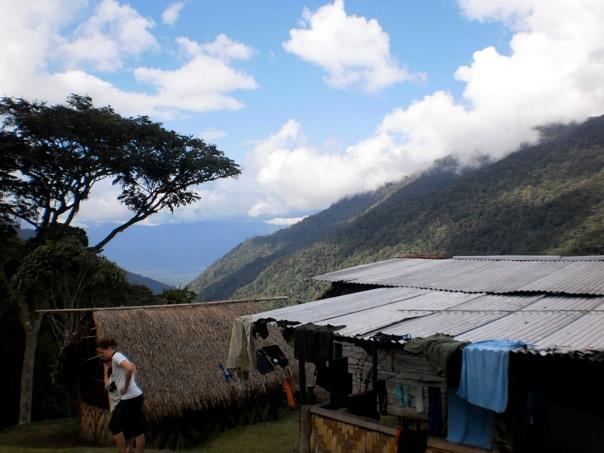
The track awaited us, we were walking through the fog. The track disappeared ahead of us as it wound down the mountain. The descent lasted an hour before we reached Eora Creek. The creek at this point was narrow, but the power of the water rushing through gave the impression of a heavy waterfall. With porters either side of us, we were gently escorted to the opposite side in safety.
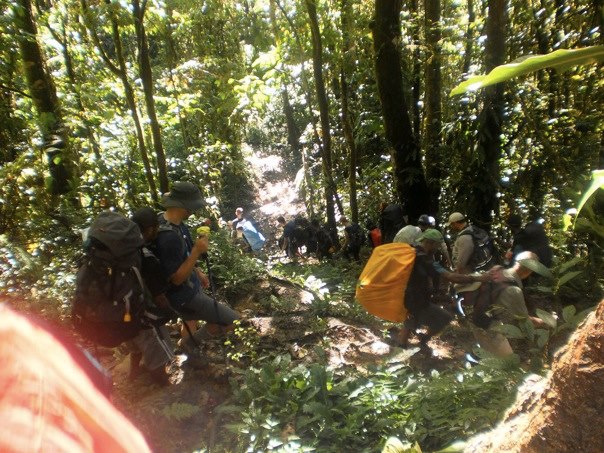
The track wound up the side of the mountain, a slope whose gradient was a constant burn in the legs. I recall exactly how I took my mind off the pain – I conjugated verbs in French.
Être: je suis, tu es, il est, elle est, on est, nous sommes, vous êtes, ils sont.
Avoir: j’ai, tu as, il a, elle a, on a, nous avons, vous avez, ils ont.
Aller: je vais, tu vas, il va, elle va, on va, nous allons, vous allez, ils vont.
I muttered every verb under my syncopated breath, every single verb I knew conjugated into every tense I knew. To anyone who could hear, I could have been muttering spells or incantations in latin, conjuring aid from spirits of the forest.
At the top of the ridge, our group leader stopped us. To our left, the mountain fell away down a steep decline. To our right, the mountain swelled like a bulbous lump in the earth, covered sparsely with thinly trunked trees. We were all asked to pay 10 Kina here, the purpose of which was for preservation of what we would shortly be shown.
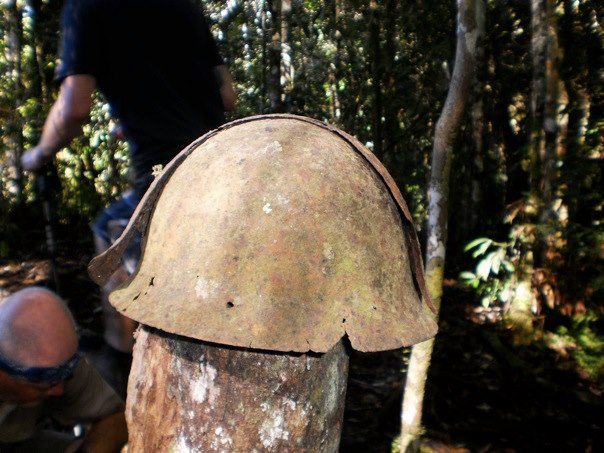
We all dropped our bags on the path and followed the group leader up and over the bulbous lump in the earth. Clambouring up the damp soil, a flat clearing awaited us at the top. Dirty cylinders the length of a forearm were piled, the spent shells of an artillery gun. This was an advantageous position in the ridge, as it had excellent perspective over the valley and the mountain to the other side.
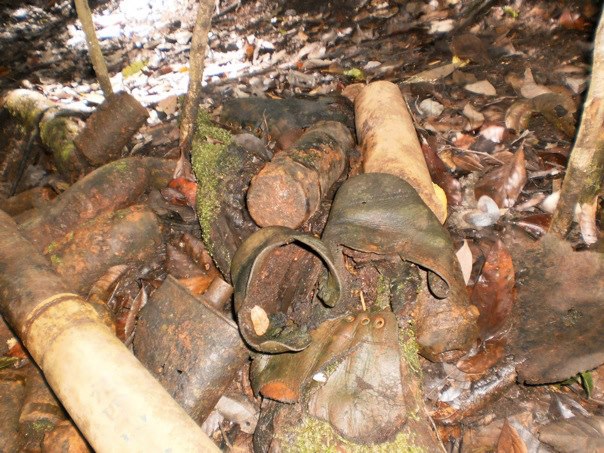
The trench was still there. The leather upper of a soldier’s footwear, though now covered in mud and torn in several pieces, retained its shape as a boot. Canteens, grenades, ammunition, and helmets were all gathered in this spot. A real piece of history, a true representation of a battle gone-by. To think that the men were camped out here day in and day out, through the tropical heat of the day and the bug-infested nights.
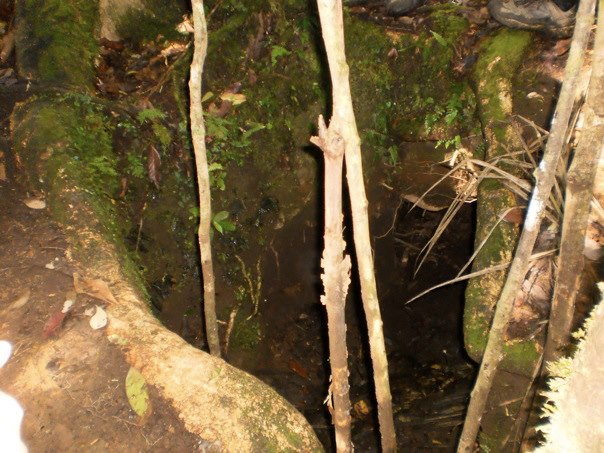
We were ushered to continue down the track and all of us went somewhat gingerly down the swollen mound of earth. Re-saddling our packs, the track took us further down to the other side of the mountain where Eora Creek met us once again. Due to the width of the creek at this point, the track took us through the water and this was our first water crossing. Our hiking boots came off and were replaced with reef booties. To sit on the ground and relax for the five minutes we had was glorious.
There were no logs laid across the water, no fixed posts to hold on to. The porters crossed with just a few large branches and a length of rope. The rope would serve as our makeshift railing onto which we could hang on to as we crossed. The branches were propped up along the rope to give it tension and keep it above the water.
The humidity and the searing heat was bearing down on us from above. I stepped into the water holding Auda’s hand. My feet were swallowed by the icy gulp and every step forward was deeper still. The shock of the freezing water was, at first, pleasant and cooling, then quickly escalated into an agonising burn. It was motivation enough to cross the creek hurriedly.
Once everyone was across, the porters pulled down the branches and ropes. Around the bend of the track was the second water crossing. This time, enormous trees that had clearly been cut down a long time ago were laid across the water, connecting the shores. Though the dry option was there, some of the guys thought it was courageous to wade waist-deep in the freezing cold water.
Off came the reef booties and on went the hiking boots. From here we could look straight up at the mountain face and see the path zig-zagging upwards. The switchback track allowed us to climb the mountain without having to be cable-secured to the wall. It was steep, at times we were on all fours pulling ourselves up onto a ledge. Auda was always behind me, ready to catch me had I misstepped and fallen.
We reached the top of the switchback and resumed the hike on a medium incline, though the ground was soft from the humidity. I was up front again with the group leader, he was barely breaking a sweat while I had streams rushing down from the top of my head. I wanted to ask about life in the jungle. Trying to keep pace with him, I could barely unpack my thoughts and so I simply asked about those choko leaves that the porters were eating every night.
Four hours passed before we reached Templeton’s Crossing. As we approached, all the porters ran up ahead and began to prepare for lunch. Our bodies ached, we were exhausted and very certainly under-nourished. We craved meat. If anyone had said I could eat a horse, they wouldn’t have been speaking in metaphors.
The porters had the big pot on boil, steam billowing out the top. I walked down to the river to wash the mud off my boots. Sarah was out of water and I had only just dropped the purification tabs into my two bottles 15 minutes beforehand. I took out the Lifestraw and took a drink directly from the river. The water was cool, crisp, and refreshing. It tasted pure, just like you would imagine. Sarah took her turn, lay on the bank of the river and drank from the source. It was fairly difficult to drink through the straw as you really did have to draw quite hard to even get a drop of water – but once you started the flow, it became easier to drink.
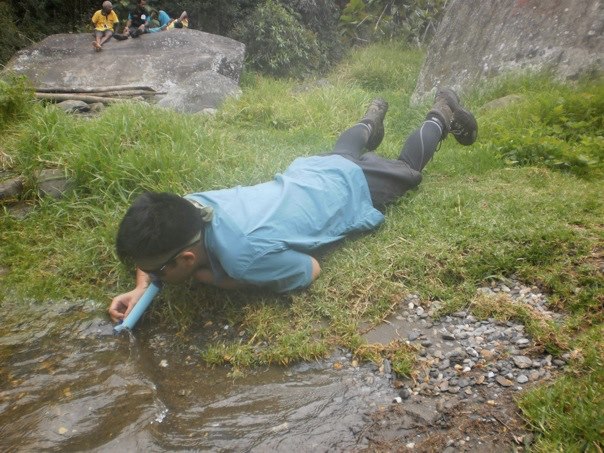
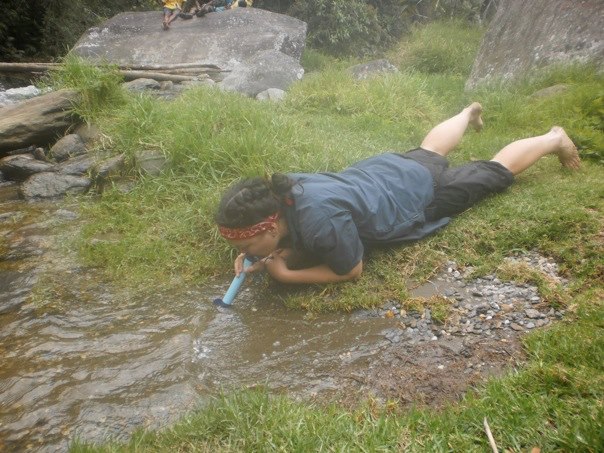
We could smell lunch from over the grassy knoll. The aroma of meat drew me back to the group. Noodles and corned beef was on the menu, a welcome combination of carbs and protein.
Everyone gathered their belongings, some had been drying their clothes in the sun. We resumed the hike, taking a small trail that was hidden between large boulders and rocks. Auda assured me that the trail from here would be flat, same as the last four hours – that was not the reassurance I was seeking.
Auda would stay hot on my heels, everywhere I went he was close behind – like a shadow, but more like an overprotective parent chasing their child. If I wanted to be at the front of the group, we would have to speed up to overtake everyone. I could tell this made Auda nervous. As soon as I changed gears, I would zip away down the hill over slippery, muddy roots and all – I would immediately feel a slight pull of my backpack, Auda holding on to me.
After some time I decided to fall to the back of the line and spend time with Sarah. Being in the jungle and sharing the experience was an amazing way to bond. She had a blister on her heel that was causing intense pain with every step. I could see the strain in her expression, but she did not let it break her spirit. I admired her strength and determination to push through the pain and keep her forward momentum. The path took us down to a river, another crossing to make. White water, churning. The thrill of crossing the rapids was quickly deflated when we spotted the bridge constructed with branches of all thicknesses, bound together into a single, large and sturdy structure.
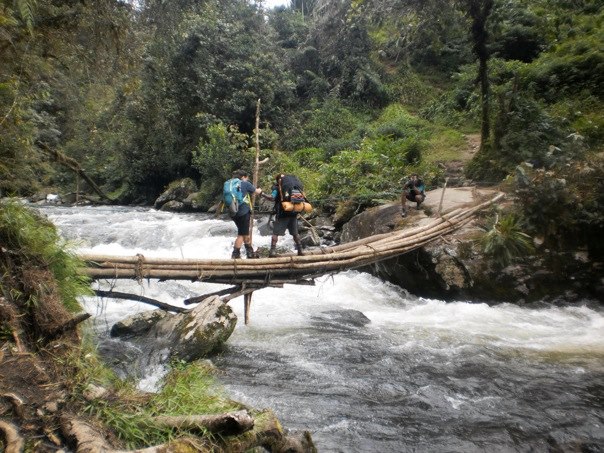
30 metres ahead, up and over a small bluff, we made camp for the night. I dropped my bag down, grabbed a towel and ran straight back down to the river. We found a calm spot ahead of the rapids where we could wade out and bathe. Clearly no lessons were learnt from the river crossings earlier in the day, overcome with the excitement of washing away a day’s sweat, dirt, and grime. I walked straight into the cooling water. Immediately, I realised my mistake and felt the icy bite all over. I ducked my head under the water, ensuring no part of my body was left unwashed and quickly exited the freeze.
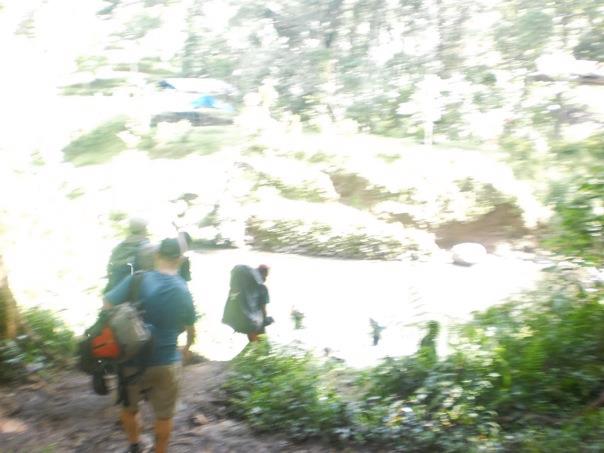
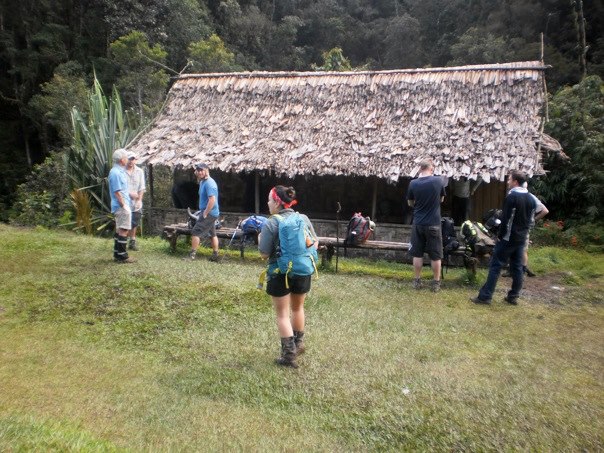
The pitter patter of the early evening rains gently grew into a loud torrent of heavy raindrops on the corrugated iron roof. Sarah was on the verandah inspecting the heel of her right foot. I went inside and picked up her first aid kit and returned to her to help redress the wound. The blister, once a soft, small bubble, had now grown large and had burst open, bleeding. The skin had torn from the sides and left a large part of the flesh exposed beneath.
To avoid further infections, we cleaned out the blister and cut off the top layer of skin that had torn from it. Sarah surgically used scissors to cut the blistered skin from her left foot. Pain washed over her face, I redressed the wound. She began to cut the blistered skin from her right foot, but couldn’t complete the operation. I took over as tears streamed from her eyes. I could only imagine how it would feel to hike the next five days with amateurly bandaged wounds on the soles of her feet.
With Sarah’s feet now wrapped up, we joined the group by the campfire. We sat under a grass hut with walls on three sides, the fire set up in the middle. With air only allowed to escape horizontally through the open side of the hut, the entire inside of the hut was a smoky haze. It was cold by now and the sun had set, the rain still pounding down hard onto the grass roof above us. The smoky hut, though rendering everyone teary-eyed, was a refuge from the elements.
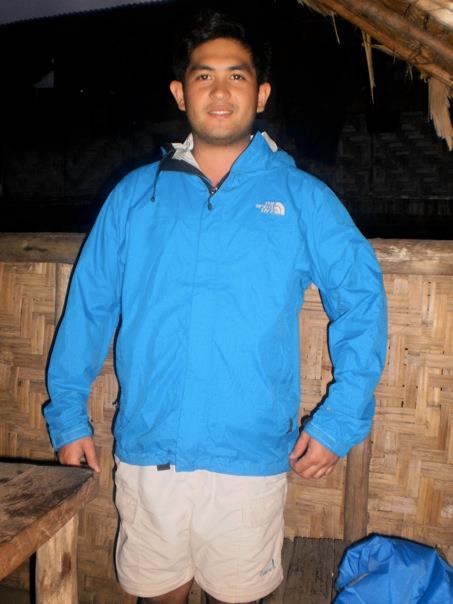
Everyone was exhausted, sitting in silence. We didn’t even notice the porters who were busy preparing dinner. They brought over the largest pot and set it on the fire in the middle of the hut. Inside, bubbling away, was a delicious chicken risotto. I was not even concerned about how or where the chicken came from, all I knew was that I was going to eat well tonight.
With our bellies full of hot risotto, it was easy to fall asleep. Slumber came upon me as did the snores.

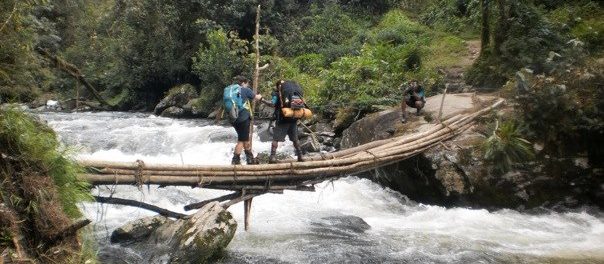





Leave a comment